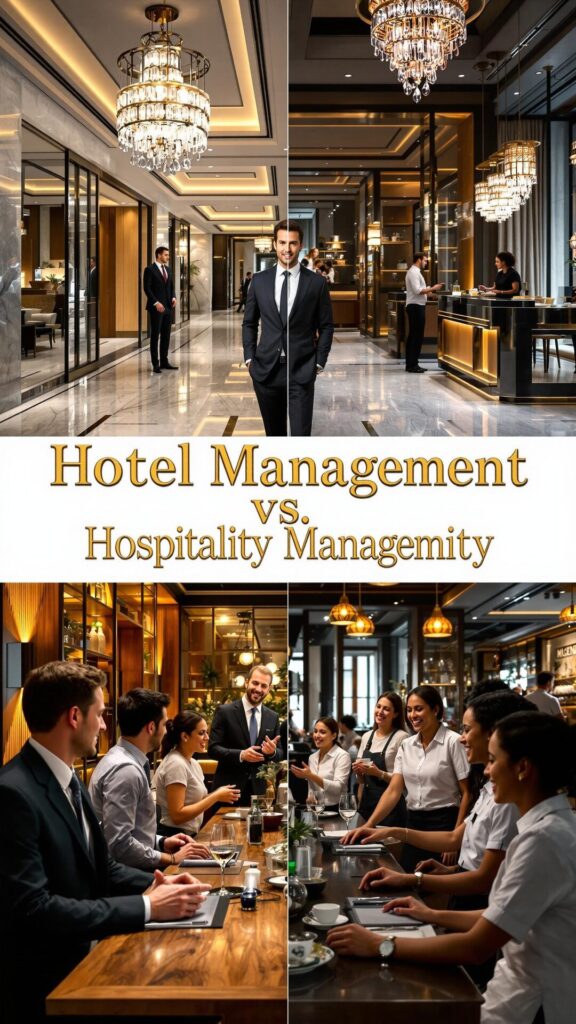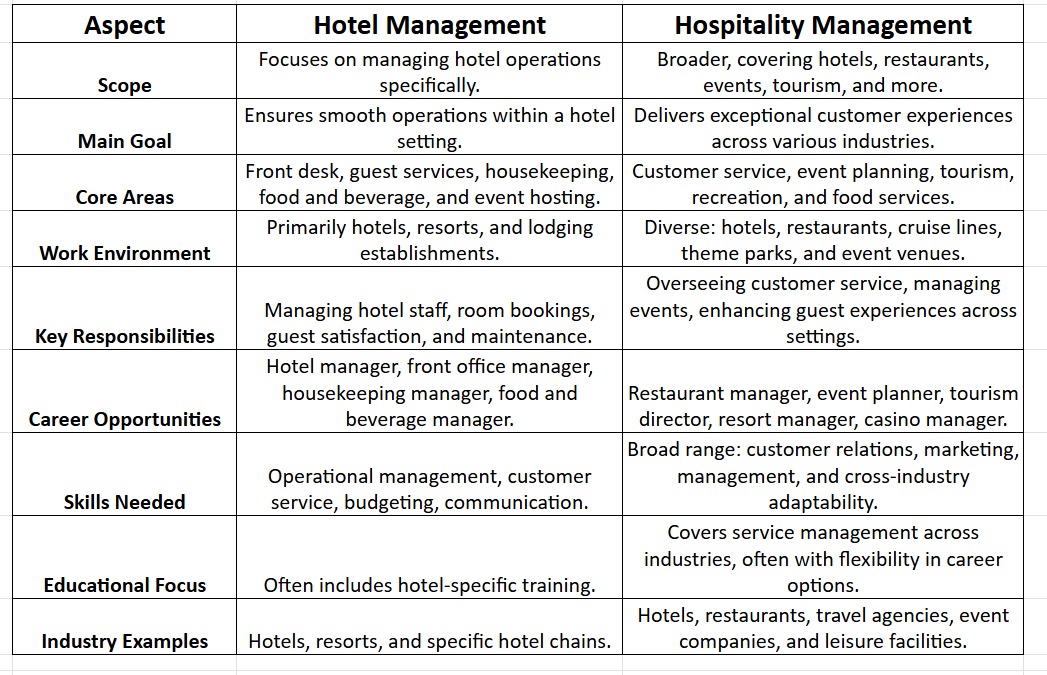
When we think of a career in the service industry, hotel management and hospitality management often come to mind. Both fields promise dynamic environments, diverse career opportunities, and the chance to interact with people from all over the world. But while they share similarities, these two career paths have distinct differences in focus, skills, and job roles. Whether you’re considering a degree, looking to change careers, or simply curious about what sets these two fields apart, this blog will guide you through the core distinctions between hotel management and hospitality management, helping you find the best fit for your ambitions in the industry.

Hotel management refers to the specialized field focused on overseeing and managing the operations of hotels, resorts, and similar lodging establishments. It covers the practical and administrative tasks needed to run a successful hotel, such as guest services, front desk management, housekeeping, food and beverage operations, and event planning.
Core Areas in Hotel Management:
Hospitality management encompasses a broader spectrum of the service industry, covering not only hotels but also restaurants, event planning, theme parks, cruise lines, and other businesses that focus on providing exceptional customer experiences. This field is dedicated to creating enjoyable and memorable experiences for customers across various settings.
Core Areas in Hospitality Management:
Aspect | Hotel Management | Hospitality Management |
Scope | Focuses on managing hotel operations specifically. | Broader, covering hotels, restaurants, events, tourism, and more. |
Main Goal | Ensures smooth operations within a hotel setting. | Delivers exceptional customer experiences across various industries. |
Core Areas | Front desk, guest services, housekeeping, food and beverage, and event hosting. | Customer service, event planning, tourism, recreation, and food services. |
Work Environment | Primarily hotels, resorts, and lodging establishments. | Diverse: hotels, restaurants, cruise lines, theme parks, and event venues. |
Key Responsibilities | Managing hotel staff, room bookings, guest satisfaction, and maintenance. | Overseeing customer service, managing events, enhancing guest experiences across settings. |
Career Opportunities | Hotel manager, front office manager, housekeeping manager, food and beverage manager. | Restaurant manager, event planner, tourism director, resort manager, casino manager. |
Skills Needed | Operational management, customer service, budgeting, communication. | Broad range: customer relations, marketing, management, and cross-industry adaptability. |
Educational Focus | Often includes hotel-specific training. | Covers service management across industries, often with flexibility in career options. |
Industry Examples | Hotels, resorts, and specific hotel chains. | Hotels, restaurants, travel agencies, event companies, and leisure facilities. |

Both hotel management and hospitality management offer rewarding career paths within the service industry, each with unique responsibilities and opportunities. While hotel management is tailored to the specific needs of hotel operations, hospitality management provides a broader foundation, preparing professionals for various customer-focused roles across different sectors. Choosing between these fields ultimately depends on your career interests—whether you prefer specializing in hotel operations or embracing a wider range of hospitality experiences.
1. What skills do I need to succeed in hotel management?
For success in hotel management, you’ll need strong organizational skills, attention to detail, customer service expertise, leadership abilities, and financial management knowledge. Adaptability and problem-solving skills are also crucial.
2. Which field is better for someone interested in a specific area, like event planning or restaurant management?
If you’re interested in event planning or restaurant management, hospitality management is the better choice, as it covers these sectors. Hotel management would be more focused on lodging operations and guest services.
3. Are there job overlaps between hotel management and hospitality management?
Yes, there are overlaps. Many hotels operate as part of larger hospitality brands, meaning hotel managers often handle broader hospitality functions. For example, hotel management may involve event planning or restaurant management within the hotel setting.
@Copyright 2023 Teachwell all rights reserved